The Support Group for Islam and Muslims, linked to al-Qaeda, announced on August 8 that trucks supplying the city would no longer be allowed to pass through. Some goods still reached there, but trucks and boats had been attacked so that many carriers no longer dared to take the road, which had created shortages and price increases in the city. But for several days, Jnim has agreed to ease this blockade.
3 mins
The Jnim would have agreed to lift the blockade gradually: the roads linking Timbuktu to Tonka or Goundam would thus no longer be threatened. For the moment, access to goods vehicles coming from Algeria or Mauritania has still not been released, but it could be released quickly. River transport should be able to resume in the coming days. Details cross-checked with several local notables, but which, contrary to the announcement of the establishment of the blockade at the beginning of August, have not been the subject of direct communication from Jnim to date.
Houka-Houka
According to these same sources, Houka-Houka Ag Alhousseini played a key role in the negotiations. The former Islamic judge of Timbuktu, when the city was occupied by al-Qaeda and Ansar Dine in 2012, today poses as an intermediary between the Malian transitional authorities – who even awarded him a decoration last year – and the Jnim of Iyad Ag Ghaly, to which he is reputed to be close. Houka-Houka therefore supported the efforts of the good offices mission led for a month and a half by traditional and religious notables from the regions of Timbuktu and Taoudeni. To obtain, about a week ago, a reduction in the blockade.
The Maouloud festival (the birth of the prophet in Islam) could also have made it possible to soften the position of the jihadists, while the Timbuktu residents had to adapt their celebrations on Wednesday due to the night curfew established in the region.
Read alsoMali: the Jnim jihadist group imposes a blockade on the city of Timbuktu
No shortage
Among the residents contacted in Timbuktu, some express their relief and note a certain improvement, others are more skeptical and assure that they have not yet noticed any real change. In any case, if certain prices continue to be higher than usual, particularly for gasoline, and if certain businesses are still closed, no shortage has been reported.
Requested by RFI, the governorate of Timbuktu did not respond. The Malian transitional authorities have always denied the reality of this blockade. Despite the testimonies of residents and communications made directly by Jnim on the establishment then the exacerbation of this blockade, Bamako has repeatedly denounced a media campaign. While recognizing an increase in attacks on supply routes and promising a strengthening of the military response.
Read alsoBlockade of Timbuktu in Mali: more than 30,000 displaced, increase in prices, denial by the authorities
Not a truce
The easing of the blockade, intended to alleviate the living conditions of the civilian populations, does not however in any way constitute a truce in combat actions: the Jnim claimed responsibility for the attack on Wednesday on the Acharane military camp, around thirty kilometers from the city. Supporting photos and videos, the Jnim claims to have taken control of the camp, killed “ many soldiers » Malians and recovered a large quantity of vehicles and weapons. The Malian army assures that it has “ repelled the attack ”, but did not provide its own assessment.
